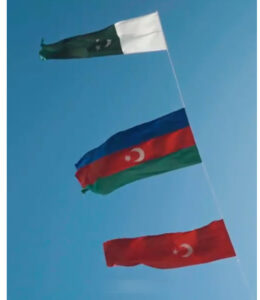
By Dr. Yasir Masood (Beijing-based Pakistani Political and Security Analyst)
Pakistan, Azerbaijan share a rich history of diplomatic, economic, and defence ties, a partnership which has been steadily growing in strength since Azerbaijan’s independence from the Soviet Union in 1991. This relationship is deeply rooted in shared security challenges, strategic interests, and cultural affinities, making collaboration in the defence sector a particularly strong pillar. As the global geopolitical environment becomes increasingly uncertain, Pakistan and Azerbaijan have a unique opportunity to further develop their defence partnership, ensuring mutual benefits for both nations.
From the outset, Pakistan was among the first countries to recognise Azerbaijan’s independence, marking the beginning of a relationship that has evolved into a strategic alliance. This foundation, built on mutual trust, quickly expanded to encompass military cooperation in the 1990s, laying the groundwork for the robust defence ties seen today. High-level military visits, joint exercises, and defence equipment exchanges have become regular features of this partnership, contributing to the strengthening of both nations’ military capabilities.

Pakistan and Azerbaijan have consistently faced similar challenges, particularly when it comes to territorial disputes and security concerns. Pakistan, in its western provinces like Balochistan and Khyber Pakhtunkhwa, has long dealt with the threat of separatist insurgencies and terrorism. Azerbaijan, meanwhile, continues to contend with the Karabakh conflict, where around 20% of its territory has been occupied by Armenian forces since the early 1990s. These parallel experiences have forged a strong sense of solidarity between the two countries, enabling them to collaborate effectively on military and counterterrorism efforts.
Throughout the Karabakh conflict, Pakistan has stood firmly behind Azerbaijan, supporting Baku’s sovereignty and territorial integrity. Islamabad’s diplomatic and moral backing during Azerbaijan’s struggles with Armenia has strengthened the bond between the two countries, and this unwavering support remains a key factor in their deepening defence partnership. Recent joint military exercises such as the “Mustafa Kemal Ataturk 2024” drills serve as a testament to the growing military collaboration aimed at improving Azerbaijan’s defence preparedness and capabilities.
The defence ties are not limited to joint exercises and training alone; they extend into defence production and procurement as well. Pakistan has become a significant supplies of defence equipment to Azerbaijan, providing assets such as the JF-17 Thunder fighter jets, Al-Khalid tanks, and Super Mushshak trainer aircraft. These acquisitions have enhanced Azerbaijan’s military capabilities and, at the same time, bolstered Pakistan’s defence industry, which saw exports valued at approximately $1.3 billion during the fiscal year 2023-24.
This partnership goes beyond mere procurement, as both nations are exploring joint ventures in defence manufacturing. Pakistan, with its proven expertise in producing cost-effective and battle-tested equipment like the Baktar Shikan laser-guided missile, stands to benefit from Azerbaijan’s defence industry modernisation. Azerbaijan’s collaboration with Turkey, as evidenced by the $1 billion Baykar Makina joint venture, demonstrates its commitment to modernising its military infrastructure. By leveraging these respective strengths, Pakistan and Azerbaijan have the potential to create collaborative projects that will not only meet their defence needs but also open up new export opportunities.
However, challenges persist in fully realising the potential of this defence partnership. Both nations face budgetary constraints and competing priorities, which could slow the pace of cooperation. According to estimates by the Stockholm International Peace Research Institute (SIPRI), Pakistan’s defence budget was approximately $11.8 billion in 2023-24, while Azerbaijan’s military expenditure stood at around $2.9 billion in 2024. These figures highlight the resource limitations both countries must contend with, necessitating a strategic approach to defence collaboration that maximises the impact of their investments.
Additionally, their relationships with key regional players add further complexity to the partnership. Pakistan’s ties with Turkey and Azerbaijan’s partnerships with Russia and Iran must be carefully managed to ensure that their defence cooperation does not cause friction with these influential neighbours. Maintaining a balanced approach to foreign policy while deepening bilateral defence ties is critical for both nations to navigate the complexities of the regional security environment.
Nevertheless, the strategic rationale for strengthening the Pakistan-Azerbaijan defence partnership remains compelling. In an era of shifting global power dynamics and evolving alliances, both nations stand to benefit from a robust military alliance that enhances their security, fosters greater self-reliance, and increases their bargaining power on the world stage.
Looking ahead, Pakistan and Azerbaijan should consider institutionalising regular joint military exercises, such as the recently announced “BAKÚ-2024” drills. This would not only solidify their defence collaboration but also send a clear signal of their commitment to enhancing regional stability. Furthermore, increased cooperation in technology transfers and the co-production of advanced defence equipment, including Unmanned Aerial Vehicles (UAVs), would provide both nations with the tools needed to address evolving security threats.
Collaboration in the maritime domain also offers promising avenues for future cooperation. Given their geostrategic locations, Pakistan and Azerbaijan could work together on maritime security initiatives in the Arabian Sea and Caspian Sea, respectively. Such efforts could contribute to enhancing regional security and countering threats such as piracy and illegal trafficking.
Ultimately, the success of this defence partnership will depend on both countries’ ability to turn their shared aspirations into concrete outcomes. By building on their existing relationship and seizing opportunities for deeper collaboration, Pakistan and Azerbaijan can secure their national interests, contribute to regional peace, and assert their influence in an increasingly multipolar world. ( Source: Azer News with thanks)


